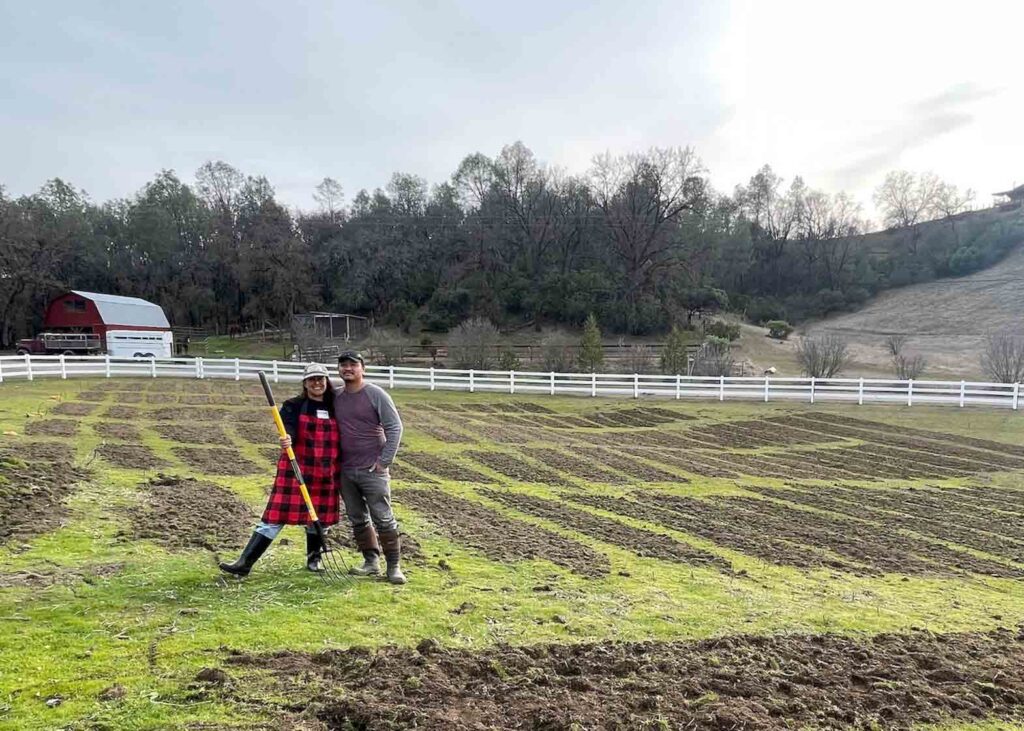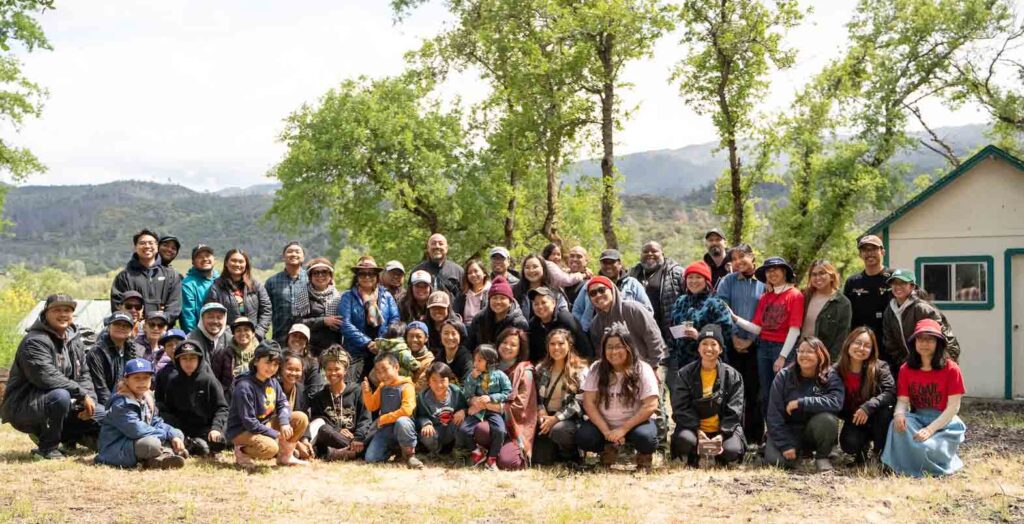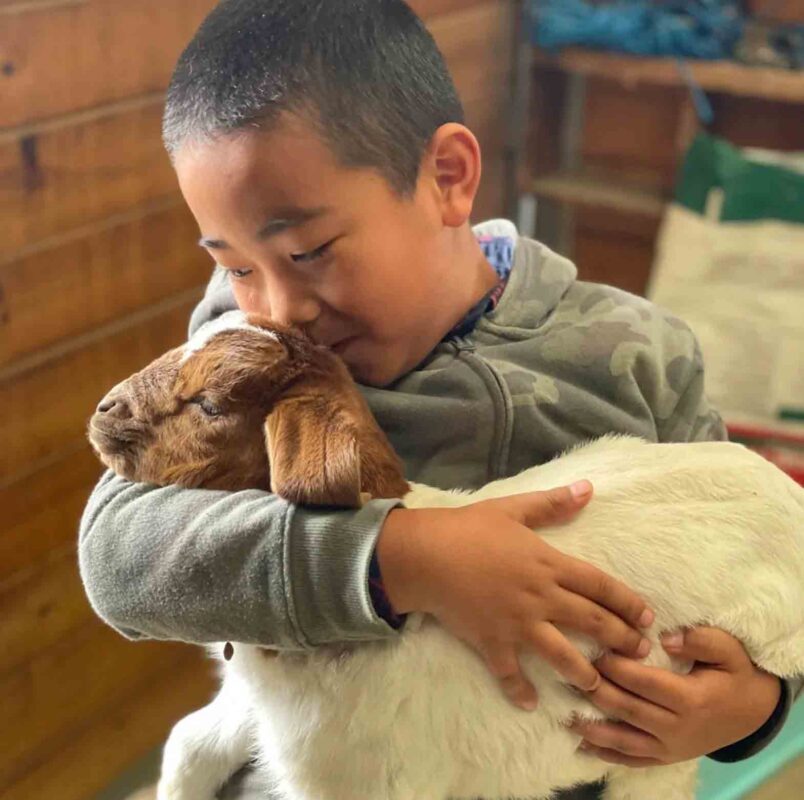Family reinvents life after son’s death and pandemic

Dr. Robyn Magalit Rodriguez and Joshua Xiong Vang at their Remagination Farm. CONTRIBUTED
KELSEYVILLE, California – A family-owned research and social enterprise known as the Remagination Lab now offers virtual and in-person life skills and survival programs and services through two of its initiatives and “campuses,” the Amado Khaya Healing House and the Remagination Farm.
Founded by Dr. Robyn Magalit Rodriguez and Joshua Xiong Vang, the Remagination Lab and its services are “geared toward those who identify as Black, Indigenous, People of Color (BIPOC) and other intersectional identities and the organizations that serve them.”
The other initiatives under the lab are the School for Liberating Education and ElementALL.
“We call ourselves the Remagination Lab and Farm because it is a place to foster creativity, imagine ourselves differently, and the kind of life we can lead,” says Dr. Rodriguez.
Gaining inspiration from John Lennon and Yoko Ono’s song, “Imagine,” to Grace Lee Boggs’ speech, “Reimagine Everything,” Rodriguez says that their enterprise is “an invitation to try to do and be different.”
The catalyst for this endeavor was the COVID-19 pandemic, climate catastrophes in the form of increasingly devastating wildfires in California, and the untimely death of Rodriguez’ son, Amado Khaya Canham Rodriguez.

With attendees of the Farm Launch last May 6, 2023. CONTRIBUTED
Rodriguez and Vang thought about the deep connection of the pandemic with “shifts that are happening for our planet” and climate catastrophes being “one of a range of symptoms that are impacting us.” As a family, they felt that “We really need to resolve to shift our relationship to the land and our use of resources.”
Like many during the height of the pandemic, Rodriguez and her family turned to nature and the outdoors “because other opportunities to connect were closed off,” says Rodriguez. “COVID was an invitation for us to really think about what we were going to do differently as a family.”
Amado Khaya, who was then in the Philippines working with indigenous communities in their fight for land, livelihood and ancestral domains, eased his mother’s concerns about his safety and survival by assuring her that the indigenous people he was with knew how to survive. That if all stores closed down and supplies were cut off, indigenous people knew how to live off the land.
This, in turn, made Rodriguez and Vang question their own survival skills in the event that the world shuts down. “Among the ideas that we had at the time was, ‘How would it look like for us to rescale our lives; really live much more simply?’ and ‘What would it look like to actually live on a farm,’” says Dr. Rodriguez.

Ezio “Zee” Vang with a new kid goat at the Remagination Farm. CONTRIBUTED
You may also like: Young Fil-Am innovators win Epic Youth Leadership awards
When pandemic restrictions began to ease up, Rodriguez, Vang, and their son, Ezio aka Zee, spent some time at a rented house on Clear Lake. “Lake County was opening up and we were able to stay at a lovely place on the lake,” says Rodriguez. “We were talking about how we were so looking forward to Amado coming home because we wanted to show him the lake.”
But tragedy struck. Amado Khaya’s sudden death brought the kind of pain that pushed them to reassess and change how they lived in this world. “You know, loss really does things to you. You want to pledge to live your life in new kinds of ways.”
Rodriguez decided to exit the mainstream education system “to embrace other kinds of work where I could better do the teaching and the research I really care about.” This led to the creation of the Remagination Lab’s first initiative, the School for Liberating Education.
Next came the founding of the Amado Khaya Foundation that led to the Lab’s second initiative and “campus” the Amado Khaya Healing House, which “will host classes, workshops, trainings, and retreats led by Rodriguez as an extension of courses offered through the School for Liberating Education and also in partnership with other providers.”
Amado Khaya Healing House is also available to book for short stays. “It was really my husband’s idea to invest in a place of sanctuary, that would initially be a home of healing for us as a family, but he suggested that we open it up to others aligned with what [Amado] stood for.”
What remained was the promise of establishing a farm. The idea of the farm was “to remake our relationship to the land and to also survive continued climate catastrophe.” And not just for their family but also and always for the community. “That was [Amado’s] whole thing.”
Remagination Farm idea was sparked when they contracted COVID as a family. “It was like, ‘Okay guys, it’s time!’” says Rodriguez.
In late 2021 they decided to homeschool their son, Zee. Then they bought a trailer to practice simple living and started looking for land. Eventually, they found eight acres for sale that is only 20 minutes away from the Amado Khaya Healing House.
Rodriguez had purchased insurance policies for Amado Khaya when he was in high school. Losing Amado “opened up this opportunity and we decided to invest these funds this way.”
Clear Lake was a fitting choice as the location for the Amado Khaya Healing House and the Remagination Farm, not only because it is where they had found solace and healing, but also because Josh Vang had grown up going there to fish for food.
A second-generation Hmong whose parents fled Laos as refugees during the American “Secret War,” Vang had grown up throughout Northern California struggling with poverty and marginalization. His parents taught him and his siblings how to forage, fish, hunt, and trap to survive
His parents imparted to Vang the survival knowledge they had as an ethnic minority group from the jungles of Laos. Now, as manager of the Remagination Farm, he runs a program called ElementALL that promotes nature awareness and appreciation, basic survival skills informed by ancestral and indigenous land-based knowledge, and environmental justice.
Among the initial activities offered under the program are introductory workshops on camping, fishing, and survival, and guided nature hikes. “I’m teaching basic survival skills to BIPOC. Just making sure that they’re better equipped to just be out in nature and just be with the land,” says Vang. “It’s just knowledge I gained growing up. I just wanted to be able to share that knowledge.”
The Remagination Farm is also available for picnic table rentals; self-guided or guided tours; campsites, barn, and trailer rentals; and organizational retreats, wellness programs, launches and other private small events. It also hosts a number of events throughout the year and is open for day visits on most weekdays from 9 a.m. to 5 p.m. Membership subscription with benefits is also available.
The Remagination Lab “is committed to the redistribution and regeneration of resources—from revenue, food, labor and more—to those who have been historically marginalized.” Generated revenues are reinvested in the Amado Khaya Foundation, local indigenous groups, and other causes that share its principles and world-view.
Rodriguez and Vang’s son, Zee, runs his own program for kids at the farm. “We’re encouraging him to play that role for his peers,” says Dr. Rodriguez.
“I do want them to understand what nature gives us,” says Zee. “I’m going to teach other kids how to contain goats and tame them and to learn how to find obsidian and to learn how to farm.”
Zee shares his vision for the planet for his and future generations. “I would like it to look all green. Any animal and any human can live on Earth and for everyone to live in peace.

